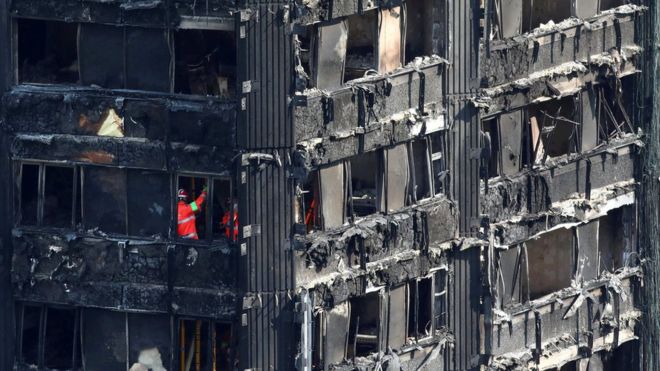 REUTERS
REUTERS
The Grenfell Tower fire inquiry "will provide answers" as to how the disaster could occur in 21st Century London, the head of the investigation has said.
Sir Martin Moore-Bick said he would "not shrink" away from making recommendations that could lead to civil or criminal prosecution.
But he rejected calls for a survivor to be appointed to the inquiry panel as it would "risk undermining impartiality".
A minute's silence was held for victims at the inquiry's first hearing.
Sir Martin told the hearing that the blaze - in which at least 80 people died - was a "tragedy unprecedented in modern times".
"We are acutely aware that so many people died and that many of those who survived have been severely affected. We are also conscious that many have lost everything.
"The inquiry cannot undo any of that, but it can and will provide answers to how a disaster of this kind could happen in 21st Century London," he added.
'Calm and rational'
However, he rejected calls from survivors to appoint a person from the Grenfell community as an adviser on the inquiry panel as it would "risk undermining impartiality".
Sir Martin told the hearing he recognised the "great sense of anger and betrayal" felt by those affected by the blaze - and would examine evidence "calmly and rationally".
He said he would "not shrink" from making any findings or recommendations "simply because someone else may consider that they form the basis of civil or criminal liability".
- Latest updates: Grenfell fire public inquiry opens
- Who were the victims?
- What happened at Grenfell Tower?
- Reality Check: Homes for Grenfell survivors
No evidence was heard on the first day of the hearing, held at the Grand Connaught Rooms in central London, and the former Court of Appeal judge did not take any questions afterwards.
An interim report is expected by Easter.
The fire started in a fridge freezer and spread quickly through the 24-storey tower block in North Kensington, in the early hours of 14 June.
A BBC investigation found that it took 30 minutes for a high ladder - used to tackle exterior blazes on high-rises building - to reach the site.
In August it was announced that the actions of Kensington and Chelsea Council, which operated the block, were to be examined by the inquiry.
The council was criticised for its immediate response to the fire, which led former leader Nick Paget-Brown to resign.
The full terms of reference for the public inquiry, which have been accepted in full by the prime minister, are:
- The cause and spread of the fire
- The design, construction and refurbishment of Grenfell Tower
- The scope and adequacy of the relevant regulations relating to high-rise buildings
- Whether the relevant legislation and guidance were complied with in the case of Grenfell Tower
- The actions of the local authority and other bodies before the tragedy
- The response of the London Fire Brigade to the fire and the response of central and local government in the aftermath
'Nightmare continues'
Miguel Alves, who escaped the fire, said residents wanted justice, and for either people or institutions responsible to be held to account.
"It's very important for us that they will come out with some outcome, some justice," he told BBC Breakfast.
"This is a big opportunity for things to be changed in the near future. If we save lives from now, at least it's something."
Shah Aghlani, who lost his